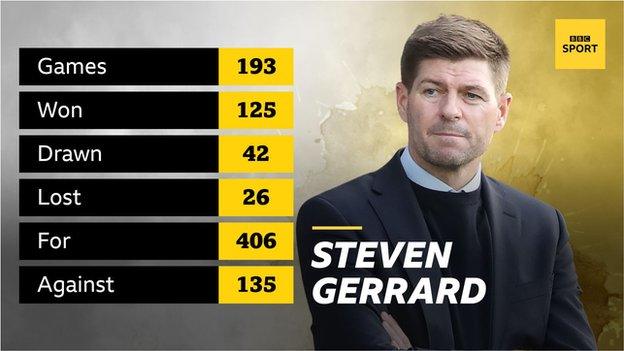Steven Gerrard: How to assess Rangers legacy after departure for Aston Villa?
- Published
Earlier in the season, after Rangers had suffered losses in Europe against Lyon and Sparta Prague, Steven Gerrard went on the front foot about what his club needed to do in order to kick on in the competition. They needed to spend "big money" as he put it.
It was a public show of frustration, a clash of where he was - at a club which now has very limited spending power after an early splurge on his watch - and where he wanted to be - at a club with the financial muscle to go toe to toe with illustrious opponents.
Many of the best Old Firm managers arrive at this point sooner or later. Most of them, however, get there only after conquering the domestic scene for a whole lot longer than Gerrard has. To express some angst about a lack of fiscal power in Europe when you have won only one domestic trophy from nine wasn't a great look.
He came across as a guy who was wanting to move on to bigger and more glamorous fights when he hadn't yet finished off the fight he was in, that being the pursuit of the kind of dominance that Celtic inflicted on Rangers for so long.
Gerrard's side had taken the league in a canter, yes. The emotional and historical significance of that title win - and the ending of Celtic's dream of 10-in-a-row that came with it - will never be forgotten by the Rangers fans.
To them, it must have felt like more than a trophy, it was a moment of profound significance, a title victory that finally drew a line under all the charlatans who associated themselves with the club in its recent past.
Gerrard was given money and, just as importantly, time by a hugely supportive board. One trophy - however momentous - is not a great legacy, no matter the 10-in-a-row-busting quality of it. There are nuances to this, though.
Any fair assessment of his time in Glasgow can't begin and end with what he contributed to the trophy cabinet. That's the bottom line for sure. That's what history will record.
In three seasons, he won one piece of silverware at a cost, in transfer fees, of many million and rapidly rising operating losses. In one season, St Johnstone's Callum Davidson won two trophies on a budget of washers. There's no getting away from that.
Watch: Rangers lift Scottish Premiership trophy after unbeaten season
To assess Gerrard fairly you have to look at the horror show he inherited. In the season before he arrived, Rangers finished third in the league, dropped points in 17 games, were humiliated 4-0 and 5-0 by Celtic and exited Europe at the hands of Luxembourg's Progres Niederkorn at the first time of asking.
They lost domestic matches to Hamilton, Dundee, St Johnstone, Hibs twice, Motherwell twice, Kilmarnock twice and Celtic four times. They concluded a lamentable season with a 5-5 draw at Easter Road.
They were ridiculed endlessly by their Glasgow neighbours. Gerrard had to rebuild his squad and did it with the munificence of his board who pushed the boat out for him to the extent that were prepared to weather heavy losses along the way.
Together, they got there. Not to a final destination, but out of the slapstick years when they were Celtic's plaything.
It cost them - and continues to cost them - but he leaves them atop a league table that will probably bring a route straight into the Champions League group stage - and the tens of millions that accompany it - to whoever wins the league.
Gerrard has put them in a good spot. It's been a hugely expensive three and a bit years, but the scale of the rebuild demanded it.
'What would Gerrard have been waiting for?'
The exit of many Old Firm managers reaches a time where the speculation careers across the line from intrigue into comedy - and Gerrard's departure was no exception.
The surreality came when footage emerged on social media of Gerrard exiting a train in London. Was it recent footage or not? Was this him on his way to meet the Aston Villa hierarchy or something older and irrelevant? If only there was a clue.
‘Scottish football will miss Gerrard’
Lo, the online detectives zoomed in on a poster for a West End show in the background as Gerrard walked across the platform. 'Pantoland at the Palladium'. Is that an old show? Oh no it's not. Is that the upcoming show running from next month starring Donny Osmond and Julian Clary? Oh yes it is.
From Thursday it was obvious that this was happening - and there was an inevitability about it. He's young, ambitious, intelligent and a massive name in the game - these are the qualities that drew Rangers to him in the first place.
Villa have seen him mature in Glasgow. They've seen him halt Celtic's hegemony. They've seen Rangers making some steady progress in Europe to the point that they are now in decent shape to make it three last-32 appearances in a row in the Europa League. Gerrard has been a cool and impressive communicator all the way through.
When Villa, a great club with a rich history, came calling, he could have stayed and pursued the kind of trophy haul with Rangers that would have marked him out as a legend. That ran the risk of failure. What if he didn't win the league? What damage would that have done to his reputation? What chance a Villa coming up again anytime soon?
Even if he'd stayed and won everything for another season or two - a massive 'if' - would that have propelled him into a different stratum in England? Almost certainly not.
History tells us that. Walter Smith went to a relegation-haunted Everton. Martin O'Neill went to Villa, Alex McLeish went to Birmingham, Gordon Strachan went to Middlesbrough, Neil Lennon went to Bolton, Brendan Rodgers went to Leicester.
Those managers were dripping with Old Firm silver and they couldn't attract the biggest clubs. Even Gerrard, with his appeal, couldn't do that. So why wait? What would he be waiting for? A Villa now or a Villa-type club a few season down the road? He decided to get on with it.
Villa are a terrific entry point for him. There will be significant pressure on him, but this is a guy who's lived with the heat his whole career as a player at Liverpool and as a manager in one of the most pressurised jobs in British football.

What might be of interest to Villa fans as they ponder what they are getting in Gerrard is that, for all his attacking excellence as a player, his success in winning the title last season was firmly rooted in defence.
He rebuilt from the back. A rearguard that was previously the softest of soft touches was gradually moulded into the stingiest unit in Scotland.
The concept of pragmatism in management has negative connotations. Gerrard is not a pragmatist - he values pace, energy, accuracy and risk in attack and was hard on his Rangers players when they didn't hit the mark.
But there was a maturity to what he did. He grew up as a manager in a ferociously demanding environment where Celtic held all the aces. He made his team more difficult to beat. Rangers are still a work in progress but they are in an infinitely better place now. Gerrard did the heavy lifting when many outside Ibrox thought the job could eat him up and spit him out.
That strength of character should serve him well in Birmingham. The fact that his trusted assistant Michael Beale and other members of the backroom team are joining him is important. As coaches, they are joined at the hip.
'More runners than Grand National in race to replace him'
Rangers fans - some or many - will resent him for leaving. That will probably pass in time. He's the guy who stopped the ritual slaughters at Celtic's hand, the guy who wrestled them from out under Celtic's thumb and made them champions.
He could - and should - have done more, but he did enough. Gerrard was a success.
And now he must be replaced. Not just him but his backroom team, too. The Rangers board will have known this day was coming. It was only a question of when. If they were doing their business they'll have been monitoring people from afar for a while, drawing up a list in readiness for the future.
The betting has more runners than the Grand National and like the great race you can discount most of them.
Fifty-one managers are currently listed on one gambling site, from Rangers old boys Giovanni van Bronckhorst, Rino Gattuso, Frank de Boer, Duncan Ferguson and Derek McInnes to European names Michael Laudrup, Paulo Fonseca, Slaven Bilic and Ronald Koeman, to the recently dismissed Steve Bruce, Dean Smith, and Nuno Espirito Santo.
The only names that appeared to be missing were Ted Lasso and Mike Bassett. It's early days, though.
The end and the beginning. Rangers came a long way under Gerrard. Not as far as they would have wanted, but a world away from the knotted shambles that greeted him on day one.
It's not where they've come from that's compelling now, however. It's where they're going - and who's leading them there.
